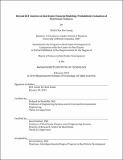Beyond DCF analysis in real estate financial modeling : probabilistic evaluation of real estate ventures
Author(s)
Leung, Keith Chin-Kee
DownloadFull printable version (1.031Mb)
Other Contributors
Massachusetts Institute of Technology. Center for Real Estate. Program in Real Estate Development.
Advisor
Richard de Neufville and David Geltner.
Terms of use
Metadata
Show full item recordAbstract
This thesis introduces probabilistic valuation techniques and encourages their usage in the real estate industry. Including uncertainty and real options into real estate financial models is worthwhile, especially when there is an elevated level of unpredictability surrounding the investment decision. Incorporating uncertainty into real estate pro formas not only provides different results over deterministic models, it changes the angle of attack to real estate valuation problems. When uncertainty is taken into account, the focus shifts from simply maximizing financial returns, to modeling and managing uncertainty to make better ex ante finance and design decisions. The ability to add optionality in probabilistic financial modeling can enhance returns by curtailing losses during downturns and taking advantage of upside conditions. A step-by-step example is carefully crafted to demonstrate the simplicity with which uncertainty, Monte Carlo Simulations and Real Options may be included into real estate pro formas. The example is entirely Excel based and is separated into three parts with each progressively increasing in complexity. SimpleCo Tower establishes the familiar Discounted Cash Flow pro forma as a starting point. ModerateCo Tower describes how uncertainty and Monte Carlo simulations can be incorporated into a pro forma while illustrating the effect of non-linearity on financial models. ChallengeCo Tower reveals how real options can add value to an investment and how it should not be overlooked. The case study illustrates how the techniques outlined in this thesis can add significant value to real estate decisions without much added effort or investment in expensive software. The case study also shows how the use of real world data to model uncertainty can be put into practice.
Description
Thesis: S.M. in Real Estate Development, Massachusetts Institute of Technology, Program in Real Estate Development in conjunction with the Center for Real Estate, 2014. This electronic version was submitted by the student author. The certified thesis is available in the Institute Archives and Special Collections. Cataloged from student-submitted PDF version of thesis. Includes bibliographical references (pages 57-59).
Date issued
2014Department
Massachusetts Institute of Technology. Center for Real Estate. Program in Real Estate Development.; Massachusetts Institute of Technology. Center for Real EstatePublisher
Massachusetts Institute of Technology
Keywords
Center for Real Estate. Program in Real Estate Development.